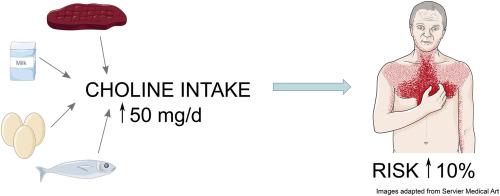Biochimie ( IF 3.3 ) Pub Date : 2019-11-07 , DOI: 10.1016/j.biochi.2019.11.001 Anthea Van Parys 1 , Vegard Lysne 1 , Gard Frodahl Tveitevåg Svingen 2 , Per Magne Ueland 3 , Indu Dhar 1 , Jannike Øyen 4 , Jutta Dierkes 5 , Ottar K Nygård 6

|
High plasma choline has been associated with the metabolic syndrome and risk of chronic diseases, including cardiovascular disease. However, dietary choline is not correlated with choline plasma concentrations, and there are few studies and contradictory evidence regarding dietary choline and cardiovascular events. In addition, a recommended dietary allowance for choline has not been established and remains a point of contention.
This study assessed the association between dietary choline, including choline forms, and risk of incident acute myocardial infarction (AMI) in patients with suspected stable angina pectoris (SAP).
In total 1981 patients (80% men, median age 62) from the Western Norway B Vitamin Intervention Trial were included in this analysis. Information on dietary choline was obtained using a 169-item food frequency questionnaire. The Cardiovascular Disease in Norway project provided data on AMI. Risk associations were estimated using Cox-regression analysis using energy-adjusted choline intake.
Median (25th, 75th percentile) total energy-adjusted choline intake was 288 (255, 326) mg/d. During a median (25th, 75th percentile) follow-up of 7.5 (6.3, 8.8) years, 312 (15.7%) patients experienced at least one AMI. Increased intakes of energy-adjusted choline (HR [95% CI] per 50 mg increase 1.11 [1.03, 1.20]), phosphatidylcholine (HR per 50 mg increase 1.24 [1.08, 1.42]) and sphingomyelin (HR per 5 mg increase 1.16 [1.02, 1.31]) were associated with higher AMI risk.
In conclusion, higher dietary intakes of total choline, phosphatidylcholine and sphingomyelin were associated with increased risk of AMI in patients with SAP. Future studies are necessary to explore underlying mechanisms for this observation.
中文翻译:

饮食中胆碱与稳定型心绞痛患者急性心肌梗死的风险增加有关。
高血浆胆碱与代谢综合征和包括心血管疾病在内的慢性疾病的风险有关。然而,饮食中的胆碱与胆碱的血浆浓度无关,关于饮食中的胆碱和心血管事件的研究很少,也没有相反的证据。此外,尚无建议的胆碱饮食津贴,这仍然是争论的焦点。
这项研究评估了饮食性胆碱(包括胆碱形式)与可疑稳定型心绞痛(SAP)患者发生急性心肌梗塞(AMI)的风险之间的关联。
本次分析纳入了来自Western Norway B维生素B干预试验的1981例患者(男性80%,中位年龄62岁)。饮食中胆碱的信息是使用169项食物频率调查表获得的。挪威的心血管疾病项目提供了有关AMI的数据。风险关联通过使用能量调整后的胆碱摄入量的Cox回归分析进行估算。
经总能量调整后的胆碱摄入量中位数(第25、75个百分点)为288(255,326)mg / d。在7.5(6.3,8.8)年的中位随访(第25、75%)中,有312(15.7%)名患者经历了至少一次AMI。能量调节胆碱(每50毫克HR [95%CI]增加1.11 [1.03,1.20]),磷脂酰胆碱(每50毫克HR增加1.24 [1.08,1.42])和鞘磷脂(每5毫克HR增加1.16 [ 1.02,1.31])与更高的AMI风险相关。
总之,饮食中总胆碱,磷脂酰胆碱和鞘磷脂的摄入较高与SAP患者发生AMI的风险增加有关。未来的研究对于探索这种观察的潜在机制是必要的。











































 京公网安备 11010802027423号
京公网安备 11010802027423号